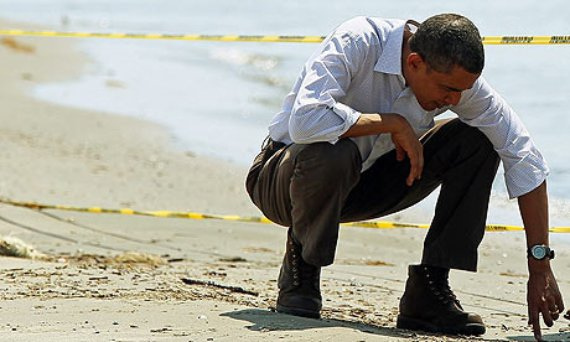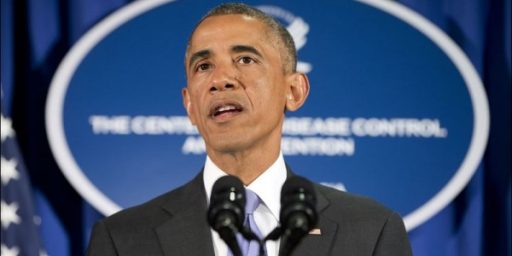Obama’s New Oil Spill Plan: An “Oil Recovery Czar”
At least one element of the plan that President Obama plans to announce in his speech tonight has been leaked, and it sounds very familiar:
WASHINGTON — President Barack Obama, in his televised speech to the nation Tuesday, will announce the creation of an oil recovery “czar” to oversee progress in siphoning crude from the Gulf of Mexico oil spill, his chief spokesman said.
Speaking on ABC television’s “Good Morning America” program, White House Press Secretary Robert Gibbs said the position is envisioned as “somebody that will be in charge of a recovery plan, putting a recovery plan together…when we get past the cleanup and response phase of this disaster.”
Mr. Obama is to deliver what will be his first Oval Office address, as he seeks to reassure anxious Americans over the Gulf of Mexico oil catastrophe.
Bruce McQuain reacts to this news by raising a very relevant question:
Well let’s see – we’ve had a commission appointed. We’ve seen the administration explore criminal charges against BP. And now, the administration that has been on top of this thing since “day one” is going to appoint “somebody that will be in charge of a recovery plan” and “putting a recovery plan together” 55 freakin’ days in to this!?
Now he’s going to put someone in charge and put a plan together?
Indeed, especially since I, like many people I think, assumed that they’d already done that when they appointed Thad Allen to be National Incident Commander back in April.
Outside of this fact, though, there’s the general objection to the whole idea of “czars” appointed by the President without the advice and consent of the Senate that seems to have infected the American political system. It started in during the Great Depression and picked up steam during World War II when various men were appointed to manage the wartime economy Various Presidents since then have utilized the concept a few times during their Presidencies since then, but it’s George W. Bush and Barack Obama who have really brought about the “czarification” of American government. While the count is as imprecise as the definition of the office, Bush appointed about 35 “czars” of varying type during his Presidency, to date Barack Obama has appointed 32.
While the idea of one person who is supposed to be in charge of all aspects of a specific problem sounds appealing to some, there are serious objections to the entire idea of unappointed officials being granted widespread authority:
[W]hat is a czar? No matter what you call them, these officials generally are seen to have special influence on the specific topic to which they are assigned.
“A czar supposedly would have accountability for something. That is, they are charged with delivering something specific,” said George Washington University professor James Bailey, adding that their authority often crosses Cabinet boundaries.
This is the case with climate czar Carol Browner, whose authority spans the Environmental Protection Agency and Department of Energy.
But such cross-Cabinet posts stand as a testament to government inefficiency, Fortune magazine editor Steve Forbes said.
“It underscores the inefficiency of government that you keep … having people, hoping that maybe they will get something done that the massive government bureaucracy cannot,” he said.
When you think about it that way, the whole “czar” concept starts to sound illogical. If the government itself it too inefficient to get a job done, what does creating yet another government job actually accomplish other than making it seem like things are getting done ?
Then again, maybe that’s the entire point.







It’s all about appearing to be solving the problem rather than solving it, just like TSA is there to give the illusion of safety rather than actual safety.
Perception always loses to reality in the long run.
Perhaps somebody like the NOAA Office of Response and Restoration/ Assessment and Restoration Division? You know, someone who has the scientists and lawyers with experience in managing settlements to restore superfund sites and oil spill damages.
Better yet, the inexperienced administration will reinvent the wheel.
I think it’s worse than that.
Since 1972, this country has had a National Contingency Plan controlling response to spills. It’s been continually revised and lengthened through public rulemaking. In 1994, the plan was revised in response to the Exxon Valdez. For oil spills off the continental shelf, I believe the Plan puts the Coast Guard as the lead agency with the EPA as a close second. BP is responsible for response actions taken which are consistent with the National Contingency Plan. Scrapping the plan is not going to be a good idea unless the situation is so bad, that building a liability case against BP takes second place.
So there is a plan and there is someone in charge; I too think it was U.S. Coast Guard Commandant Admiral Thad Allen. Why is the existing plan and command structure inappropriate?
I have Russian coworkers. It was pretty funny the day they asked (via skype) “why do you have Czars?”